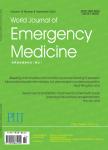Venous thromboembolism in the emergency department:A survey of current best practice awareness in physicians and nurses in China
Venous thromboembolism in the emergency department:A survey of current best practice awareness in physicians and nurses in China作者机构:Emergency Department Peking Union Medical College Hospital Oxford Centre for EnablementNuffi eld Orthopaedic Centre Accident and Emergency Medicine Academic Unit Prince of Wales Hospital The Chinese University of Hong Kong
出 版 物:《World Journal of Emergency Medicine》 (世界急诊医学杂志(英文))
年 卷 期:2019年第10卷第1期
页 面:5-13页
核心收录:
主 题:Emergency Venous thromboembolism Staff knowledge Emergency doctor Emergency nurse
摘 要:BACKGROUND: For emergency department(ED) patients, risk assessment, prophylaxis, early diagnosis and appropriate treatment of venous thromboembolism(VTE) are essential for preventing morbidity and mortality. This study aimes to investigate knowledge amongst emergency medical staff in the management of VTE. METHODS: We designed a questionnaire based on multiple scales. The questionnaire was distributed to the medical and nursing clinical staff in the large urban ED of a medical center in Northern China. Data was described with percentages and the Kruskal-Wallis test was used to compare ranked data between different groups. The statistical analysis was done using the SPSS 22.0 ***: In this survey, 180 questionnaires were distributed and 174 valid responses(response rate of 96.67%) were collected and analyzed. In scores of VTE knowledge, no signifi cant differences were found with respect to job(doctor vs. nurse), the number of years working in clinical medicine, education level, and current position, previous hospital experience and nurses current work location within the ED. However, in pair wise comparison, we found participants who worked in ED for more than 5 years(n=83) scored signifi cantly higher on the questionnaire than those under 5 years(n=91)(95.75 vs. 79.97, P=0.039). There was a signifi cant difference in some questions based on gender, age, job, and nurse work location, number of working years, education level, and different ED working ***: Our survey has shown defi ciencies among ED medical staff in knowledge and awareness of the management of VTE. We recommend several changes be considered, such as the introduction of an interdisciplinary workshop for medical staff; the introduction of a standardized VTE protocol; a mandatory study module on VTE for new physicians and nurses; the introduction of a mandatory reporting system for adverse events(including VTE).



